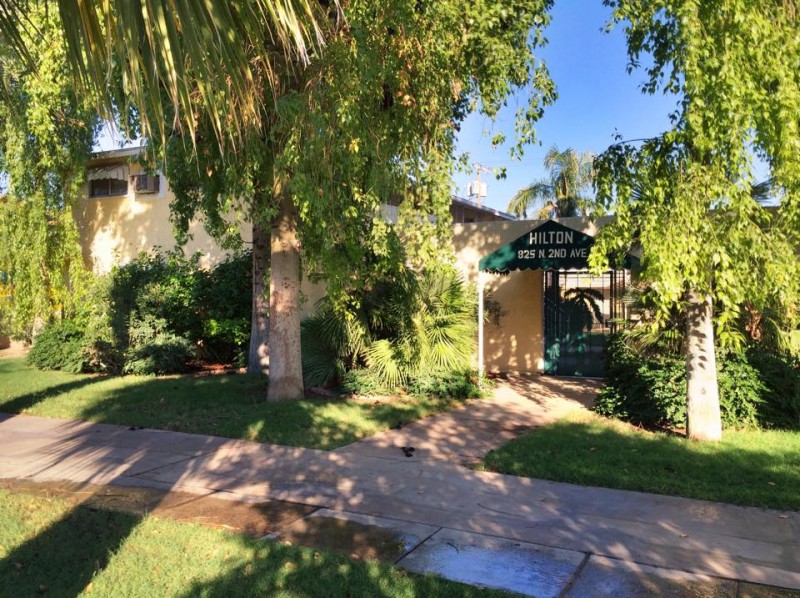For journeymen theatre careerists, the set builders and stage managers who take the show from idea to reality, it’s a given that their chosen field requires a bit of travel. This means roaming from city to city to work for months at a time at theatres and summer stocks, choosing a particular skill and developing it. At the Phoenix Theatre, this process of helping recent grads develop into skilled craftsmen is one they don’t leave to chance, and with their recent purchase of a small apartment complex in downtown, they have one more perk to entice talent from around the country.
Today, the Pope Volunteer Professional Apprenticeship Program enrolls an annual class of 10 – 12 recent grads and burgeoning professionals to work at the theatre for an entire season of shows, providing a stipend and housing for all apprentices in downtown Phoenix, making commuting easy and life in a new city more manageable.
A few years ago, the theatre launched the apprenticeship program to focus solely on the technical trade positions, which have been slowly becoming harder to fill as more theatre majors go into design versus actual craft positions, said Vincent VanVleet, Managing Director at the Phoenix Theatre. Their program focuses on training and developing those who are interested in craft positions as a career.
“The big issue when you get out of college, especially in arts, is that there are not a lot of jobs. You don’t have experience to get a job and you don’t have a job to get experience,” he said, so a program to develop new talent seemed the logical solution.
Housing is an integral aspect of creating an appealing program, and after renting nearby units to house apprentices for the first few years, the theatre purchased the Hilton Apartments property on 2nd Avenue, just south of Roosevelt Street, last November to house not only their apprentices, but also visiting actors and artists. They also maintain 10 units as standard rentals for typical residents. This mixture of theatre workers and downtown residents contributes to a creative, non-typical environment for technicians who are accustomed to traveling for their work.
“We set to task trying to find a building that could give them an urban experience as well as be close to the theatre so that there was a convenience factor,” VanVleet said.
The conversion from an academic environment to a professional theatre environment can be tricky, he says, but the appeal of moving to a temperate city with housing and a stipend has drawn a steady stream of high-quality applicants. The program received between 300 and 400 applicants last year.
“As long as people are still interested in majoring in theatre and arts, we will continue to get top-notch applicants,” Associate Managing Director Marylou Stephens said.
“Better apprentices lead to higher quality shows,” she said. “The idea is that we wanted to build an environment where people who actually wanted to do this for a living had a place to do it.”
While attractive apprenticeships draw talented people, the program itself can become a pipeline for the right candidate to join the theatre full time. Props Master Tyler Welden began his relationship with Phoenix Theatre in the apprenticeship program, which helped him bridge the gap between school and permanent work within the industry. After completing the program he took a few positions in other cities until he was invited back to Phoenix to take on a full time position.
Second year apprentice Rebekah Carriere began as a stage management apprentice, and just began her second year as a stage management journeyman. After concluding that Houston’s humidity was a deal breaker, she applied and was accepted to the Phoenix program in 2013, and is a current resident in the program housing. The studios offer a prime downtown location and community with other apprentices, she notes, and are within walking distance of the theatre.
A career that requires this kind of commitment must also offer big rewards, and for both Welden and Carriere, that reward is a show well done.
“You certainly don’t go to work because you’re getting paid a lot,” Welden said. “It’s the little things. Sometimes you sit in the audience on opening night and somebody laughs at something that you worked on … it’s a good moment, it feels nice.”
As stage manager, Carriere must constantly note everything that goes wrong. But it’s the things that go pleasantly right that make the job worthwhile.
“Right now I’m working on a lot of paperwork; looking at things and saying, ‘this is impossible to do, I don’t know how we’re going to do that,’ and then figuring out that yes, it is possible. Going through tech, figuring everything out, and then by opening … it’s all come together. People are witnessing it. You get to finally hear the applause and laughter. Each night is so different. People laugh at different things, people cheer at different things. Sometimes things break and you have to rush to fix it before it has to go onstage again. Each performance has its own little challenges.”
What might begin as an idea in a director’s head soon becomes floor to ceiling props, inventive machinery, and technical displays that creative craftsmen must engineer out of thin air and perpetuate from opening night to final curtain.
“If you could come see one of our shows, and then we could take you backwards to see how we got to that … you wouldn’t believe it,” Stephens said.
Phoenicians will have a chance to marvel at the work of everyone besides the actors, appreciate the lighting and the props, the costumes and the flawless execution, as the 2015-2016 season gets underway with The Toxic Avenger, which runs through November 22.
Photos by Lauren Potter.









